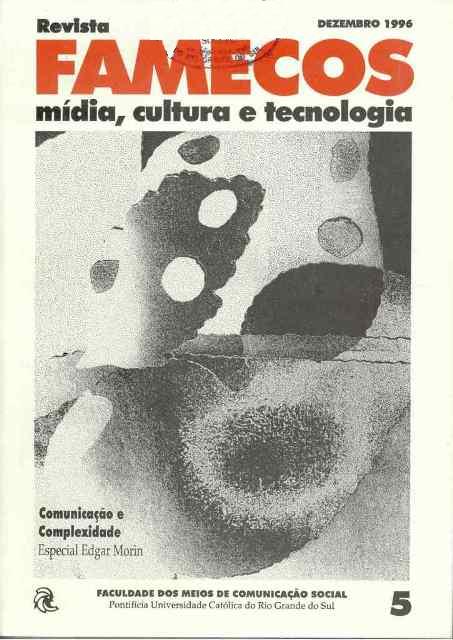The Marxist concept of ideology in British media studies
DOI:
https://doi.org/10.15448/1980-3729.1996.5.2945Keywords:
Communication, ideology, MarxismAbstract
The concept of ideology has been described in the literature as a vague, slippery concept and, for some, 'useless' (Frazer, 1988). As McLellan puts it, 'ideology is the most elusive concept within the social sciences... essentially a contested concept, that is, a concept about which there is controversy in terms of its own definition and application' (McLellan, 1986: 1).
Downloads
References
ALTHUSSER, L. Essays on Ideology. Londres: Verso, 1984.
BENNETT,T. Theories of the media, theories of society. In: GUREVITCH, M; CURRAN, J. e WOLLACOTT, J. (eds.). Culture, Society and the Media. Londres: Methuen, 1982.
CURRAN, J. The new Revisionism in mass communications research: a re-appraisal. European Jornal of Communication, n. 5, p. 135-164, 1990.
CURRAN, J.; GUREVITCH, M. e WOOLLACOTT, J. The study of the media: theoretical approaches. In: Body-Barreto, O. and Braham, P. (eds.). Media, Knowledge and Power. Milton Keynes: Open University Press, 1987.
CURRAN, J. and SEATON, J. Power Without Responsability; the press and broadcasting in Britain. Londres: Fontana, 1994.
FORGACS, D. Gramsci and Marxism in Britain. New Left Review, v. 176, p. 70-88, 1989.
FRAZER, E. Talking about Feminity: the concept of ideology on trial. Tese de doutorado não publicada, Universidade de Oxford, 1988.
GARNHAM, N. Towards a political economy of culture. In: New Universities Quartely, v. 31, n. 3, p. 341-57, 1977.
_____. ’Contribution to a political economy of mass communication’. Media, Culture and Society, 1:123-46. 1979.
_____. Raymond Williams, 1921-1988: a Cultural analyst, a distinctive tradition. Journal of Communication, v. 38, n. 4, 1988.
GERAS, N. Post-Marxism? In: New Left Review, v. 163, May-June, p. 40-82, 1987.
GOLDING, P. and MURDOCK, G. Ideology and the mass media: the question of determination. In: BARRET, M,. et al. Ideology and Cultural Production. Londres: Croon Helm, 1979.
GRAMSCI, A. Selections from Prision Notebook. Londres: Routledge, 1971.
HALL, S. Television as a Medium and its Relations to Culture. CCCS Occasional Paper, Birmingham, 1975.
HALL, S. Encoding and decoding. In: Culture, Media and Language. Londres: Hutchinson, 1980.
HALL, S. Thatcherism amongst the theorists: toad in the garden. In: C., Nelson and GROSSBERG, L. Marxism and Interpretation of Culture. Londres: Macmillan, 1988.
HALL, S. et. al. (eds.). Policing the Crisis: Mugging, the State and the Law and Order. Londres: Macmillan, 1978.
JOHNSON, R. Histories of culture / theories of ideology: notes on an impasse. In: BARRET, M.; LACLAU, E. and MOUFFE, C. Politics and Ideology in Marxist Theory. Londres: Verso, 1976.
LARRAIN, J. The concept of Ideology. Londres: Hutchinson, 1979.
MARX, K. and ENGELS, F. The German Ideology. Londres: Lawrence & Wishart, 1970.
McLELLAN, D. Ideology. Milton Keynes: Open University, 1986.
MURDOCK, G. Redrawing the map of the communications industries: concentration and ownership in the era of privatisation. In: Ferguson, M. (ed.). Public Communications: The new imperatives. Londres: Sage, 1990.
MURDOCK, G. Across the great divide: cultural analysis and the condition of democracy. Critical Studies in Mass Communication, v. 12, p. 89-95, 1995.
MURDOCK, G. e GOLDING, P. Capitalism, communication and class relations. In: Mass Communication and Society. Milton Keynes: Open University Press, 1977.
RANSOME, P. Antonio Gramsci: a new introduction. Hemel Hempstead: Harvester Wheatsheaf, 1992.
WILLIAMS, R. Culture and Society (1780-1950). Harmondsworth, Penguin, 1961.
_____. Marxism and Literature. Oxford: Oxford University Press, 1979.
_____. Culture. Londres: Fontana, 1982.
Downloads
Published
How to Cite
Issue
Section
License
Copyright
The submission of originals to Revista Famecos implies the transfer by the authors of the right for publication. Authors retain copyright and grant the journal right of first publication. If the authors wish to include the same data into another publication, they must cite Revista Famecos as the site of original publication.
Creative Commons License
Except where otherwise specified, material published in this journal is licensed under a Creative Commons Attribution 4.0 International license, which allows unrestricted use, distribution and reproduction in any medium, provided the original publication is correctly cited.






